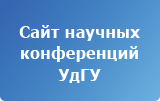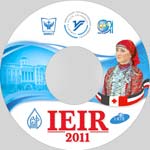IEIR 2011


May 30 — 31, 2011 
Udmurt State University,
Izhevsk, Russian Federation
The changes, that may be observed in interethnic relations both in Russia, Europe and worldwide at the turn of XX — XXI centuries, encourage scientists to review education curriculum. The goals, which are underpinned by polycultural approach, are to meet the challenges from the contemporary society. That enables educators to train university graduates and school students so that they would be able to interact in intercultural environment, to manage interethnic relations, to cope with interethnic tension. Educational institutions of the Russia, EU countries, the USA and members of the CIS have generated valuable diverse experiences in intercultural and multicultural education. Modern science shows a wide range of research results that should provide a basis for student training to allow them to work in multicultural world. Alongside with this Russia polycultural education can hardly be recognized as sustainable at large. It is acknowledgeable that Russia education requires implementing polycultural approach more effectively.
Symposium topics
- Education Tendencies in Multicultural World of the XXI century
- Multicultural, Intercultural and Polycultural Education
- Teacher and Educator Training in Multicultural World
- International and Research Projects in Multi-/Intercultural education
The symposium will include contributed paper and poster sessions, presentations, round tables and panels. The accepted papers will be published in Symposium Proceedings in English and Russian before the beginning of the Symposium. The Editorial Board plans to publish selected papers following a standard refereeing process. The Symposium Proceedings gets the ISBN, УДК (UDK), ББК (BBK) index and will be sent to the leading libraries of Russia and university libraries of EU countries.
The symposium is aimed to encourage exchanges of research results and experiences, to identify the subject areas for joint and mutual research, to analyze and assess the potentials for interactions between researchers, scientists and practitioners. The symposium will be held at Udmurt State University: there are scientific schools by Professor V.Yu. Khotinets (Psychology of an Ethnic Individual); by Professor A. N. Utekhina and Professor T. I. Zelenina (Intercultural Education); by Professor Ovechkin V.P. (Innovative Education in a Changing World); by Professor G. S. Trofimova (Competency Approach in General and Vocational Education); by Professor I. B. Vorozhtsova (Communication as a Dialogue of Cultures); by Professor N.Yu. Erofeeva (Gender Pedagogic); by Professor A. A. Baranov (Adaptation to New Social and Cultural Environment); by Docent A. V. Ishmuratov (Finnish and Ugric research); by Docent E. R. Khakimov (Polycultural Education) and others. The University is located in the city of Izhevsk which is the capital of Udmurt Republic and the home of Fino-Ugric, Slavic and Turkic ethnic groups
For any further information go to http://ppf.udsu.ru
and contact Dr. Eduard Khakimov eduard.khakimov@yahoo.com.





